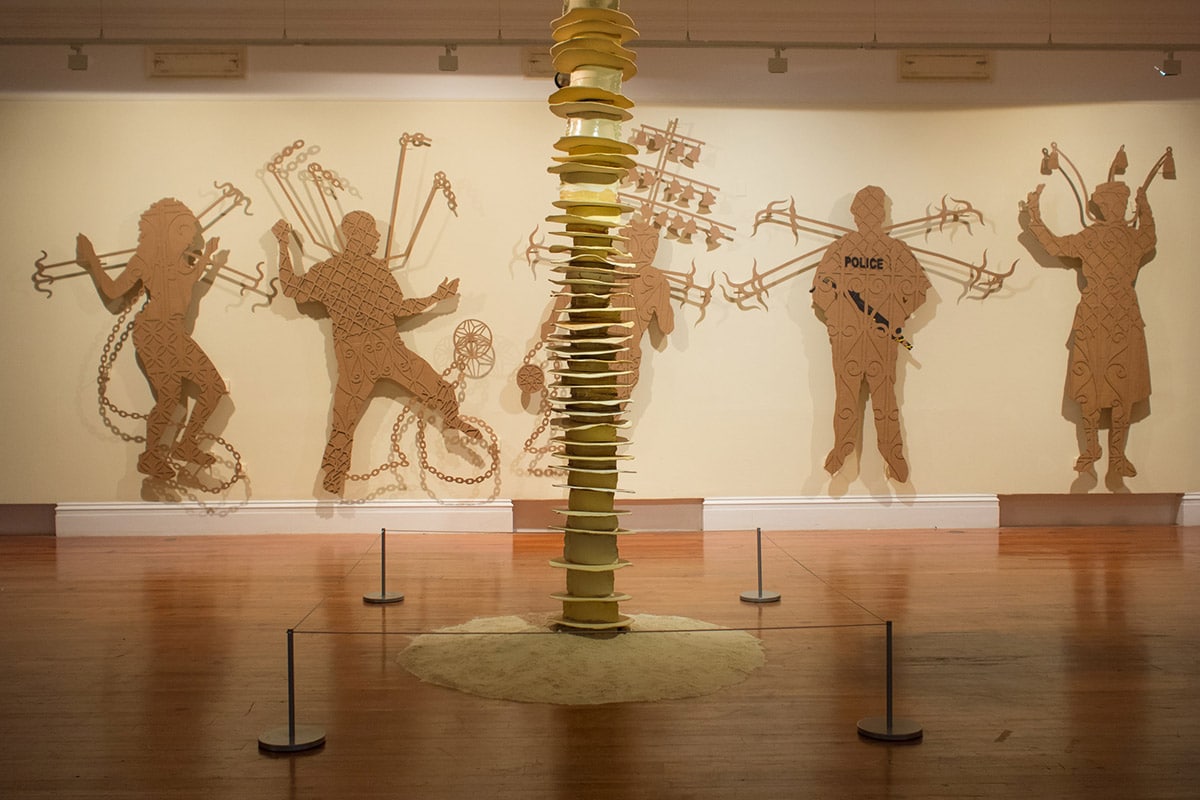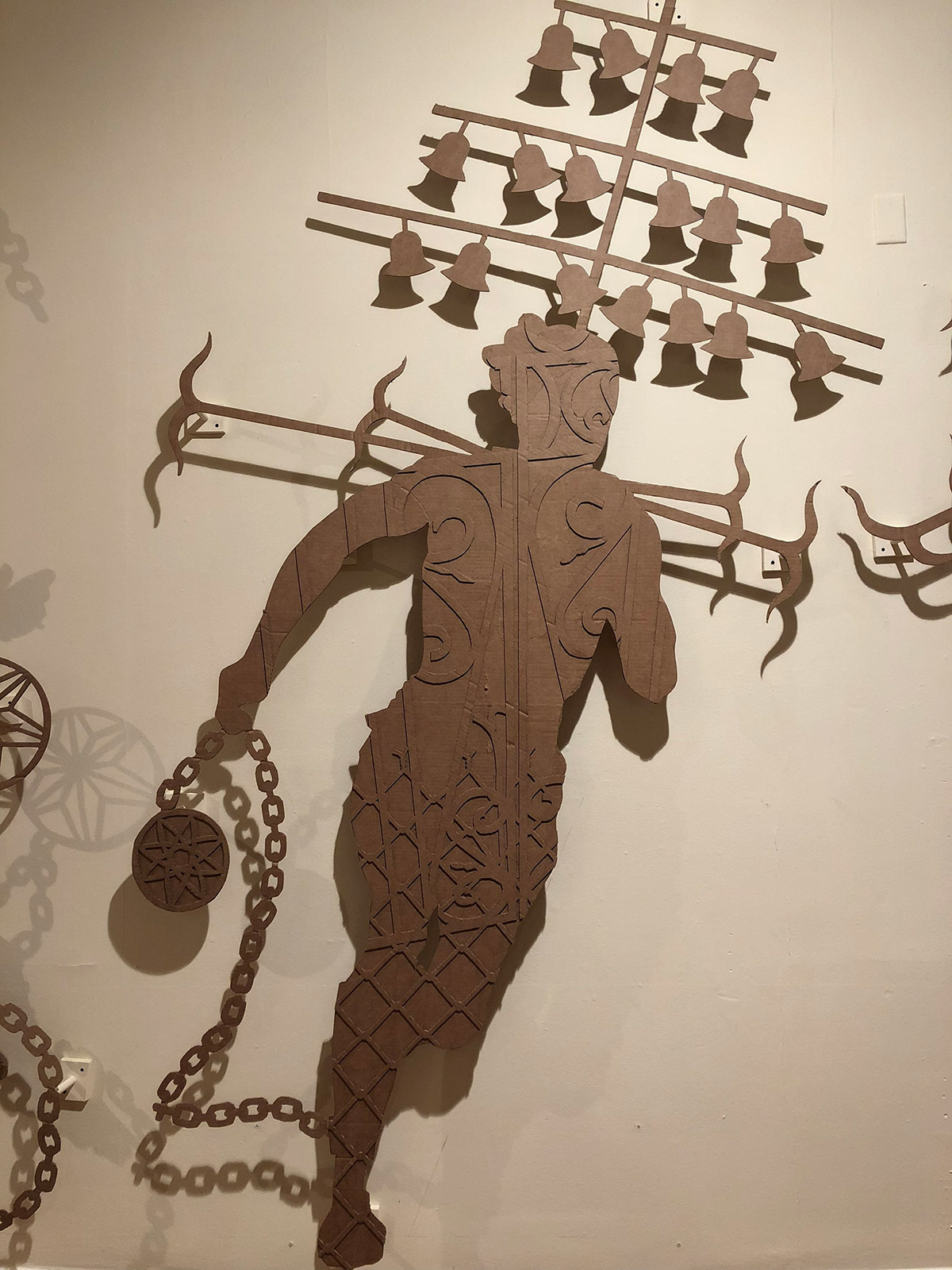
By Natalie Willis
Last week we heard John Beadle speak to his participation in “We Suffer To Remain”, an exhibition in collaboration with the British Council. The works produced in “We Suffer To Remain”–the Bahamian leg of a 4-part journey of the British Council’s “Difficult Conversations” series of exhibitions– serve as Caribbean response to Scottish artist Graham Fagen’s work, “The Slave’s Lament”. Shown at the Venice Biennale in 2015 as a representation for Scotland in the global art biennial, and choosing to uncover the country’s complicit nature in the Slave trade and the general amnesia surrounding Britain with their role and repercussions in chattel slavery – there is more to this work than meets the eye. Here is a not-so-difficult conversation with Beadle.

Installation view of “We Suffer To Remain”, including John Beadle’s “Cuffed: held in check” (2018) and Anina Major’s “Bessie’s Backbone” (2018).
NW: What about Graham Fagen’s background makes you uncomfortable with his work?
JB: Graham has the license to pick and choose to use whatever subject matter he chooses because of the colour of his skin or the environment he comes from – both. A Black person doesn’t have that license even though the subject matter might be just as wide or narrow or just as problematic, the problems and faults would be the focus for the Black person. His work is seductive, I like looking at it but I don’t like thinking about it. The seduction, the things that pull you in, that is what is going to be paid attention to in his work. I find that’s a problem, a big problem.
NW: It’s many-layered.
JB: It is.
NW: What I think most people want is for there to be more discussion among Black folks around how this work, but I also want us to be able to talk about it in its totality, which means we need white voices too. The historic difficulty just has more to do with the way that Black voices have been silenced because of the way the hierarchy works. But this is why allyship is important.
JB: Or they’re going to try and shut down the conversation. I could see right now the conversation about the piece, when we start talking about slavery and the Black experience and colonialism. Even colonialism in its widest sense – you’re always going to have some white people saying “well white people were slaves too!”
NW: That does happen often. My mother is half Irish but she doesn’t bring up the argument of how the Irish were treated or “the irish were slaves too” because it’s very, very different. There is nothing akin to chattel slavery, nothing that compares, but both events were awful. People like to make that argument in regards to the Atlantic slave trade and it becomes a sort of pain olympics of who has suffered more when that isn’t useful at all. It doesn’t mean that anyone’s suffering becomes diminished. There is still suffering, and it needs to be spoken to, criticized, but not compared to other traumas. That accomplishes nothing.
JB: I was having this conversation with a Jewish guy and he was saying “I’m tired of people talking about slavery and colonialism” and I was like, hold on. Every day I am reminded of my history and yours. I try not to talk about your people’s experience and especially not in a derogatory way. We have it in the language and all, we have derogatory language based on the prejudice.
Different people of different backgrounds speak to the same struggle from different perspectives and different experiences. To have a real, informed discussion about what race and racism have done to us as human beings you have to put yourself in someone else’s shoes. It takes being able to adjust your perspective, to empathise, to exercise patience in not saying “me too” – because the worst thing you can say when someone is trying to voice their frustration in a specific experience is to say “oh yeah that happened to me too”.

Detail of John Beadle’s “Cuffed: held in check” (2018), a series of corrugated cardboard cutouts investigating representation and stereotyping around blackness as it relates to the legacies of the Atlantic slave trade.
NW: In that vein of empathy, who do you see your work speaking to or for?
JB: I really can’t answer that. Strangely enough, I don’t look at my work as speaking for someone or being for someone. Someone asked me something similar to this, about who I think is my audience. That’s not my focus. My first focus on the work is what will I get out of it. And I think in the conversation with the work, and in this second iteration I’ve been able to work out the flaws more. And the same critique I have of Graham’s work I have of my own. Sometimes your hand is too close to your face for you to be able to see your fingers when you make the first version of a piece. So when you ask “who is it for?” I don’t know, I don’t think about it like that. My first audience is me. Second is the people who ask and want to investigate what it is. After that, people who come to it just frivolously or casually, I don’t care.
NW: Is it more personal investigation and unpacking for you?
JB: This is what sustains me.
NW: So because of the space you inhabit in the world, as a Black, Caribbean man, Bahamian and Jamaican, this might give you a more nuanced understanding of Caribbeanness than most Bahamians get. Do you think because you’re investing these ideas from a personal place and speaking about identity that they don’t speak to other people? It can’t just be personal can it?
JB: I don’t think that’s intentional though. You have a fan on, and you have the fan on because you wanna cool yourself off. But someone sitting next to you, and they enjoying the fan too.
NW: So you’re just the person turning the fan on?
JB: Ha! Yeah I just there to turn it on. I trying to feed my soul. If you feel you getting something then that’s gravy for you.
NW: Last question… How do we suffer to remain, what does that mean for you?
JB: I don’t want to respond with the first thing that came to mind, because that sounded intellectual and didn’t sound like something that would come out of my mouth.
NW: You don’t think of yourself as intellectual?
JB: No, I don’t wanna think of myself that way.
NW: In what way do you think of yourself then?
JB: A mechanic.

Headshot of Bahamian-Jamaican artist, John Beadle.
NW: You don’t think that takes intellect?
JB: No.
NW: No!? You going to have some offended mechanics reading this.
JB: The ones who think of themselves as mechanics with intellect, and I didn’t say you couldn’t be a smart mechanic y’know, they don’t call themselves mechanics. They call themselves “technicians”.
NW: Do you see yourself as a facilitator then?
JB: I’ve never thought about it. But yeah. We are all facilitators. We are indulgent too. We spend the time investigating the things we find interesting and then we throw it out there and hope people find it interesting too. We don’t actually need to put it out there, some work widens the scope of a conversation. Or makes it more pointed. But sometimes you just adding your voice to a conversation as opposed to moving it forward. Maybe I’m kind of pessimistic. But if I had to answer the original question….
We suffer to remain relevant, in existence, alive.
NW: Given the figures you’re showing and that bondage, it’s taken a lot of suffering to remain here.
JB: Yes, and we will continue to. It seems like a question a psychiatrist would ask, it probes deeper than you’d think.
NW: Maybe deeper than you want to.
JB: Yeah, maybe.
“We Suffer To Remain” is a collaboration between the NAGB and the British Council, and will run through March 22nd to July 29th, 2018.